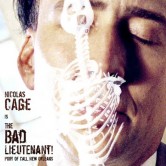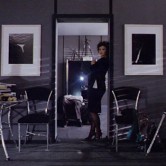Unique Trailers: NASHVILLE (1975)
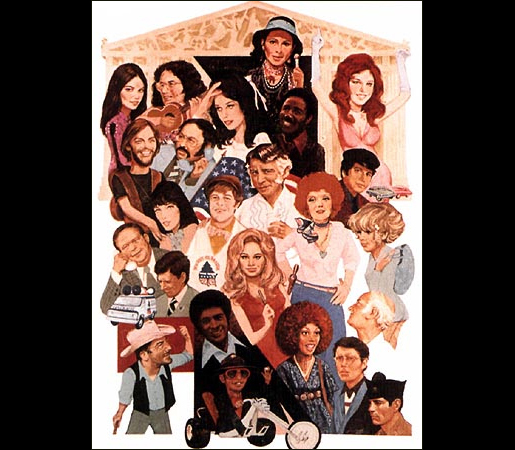
Some great movies can’t be made into good trailers: Just look at the atrocious jobs done unto Ang Lee’s The Ice Storm or Martin McDonagh’s In Bruges (watch the movie first, and then ridicule the trailer — the DVD doesn’t support the trailer either.). And sometimes there is an exception to this rule: Robert Altman’s Nashville (1975).
“The damndest thing you ever saw”.
The fast-paced introductions to the two dozen characters who appear in the movie is so involving and kinetic that your head is spinning with names and connections by the end of the trailer. The actual movie amazingly accomplishes the realization of these twenty-four characters as unforgettable and compelling individuals. Most movies get hung up on a quartet.
I saw this film again last week at a revival in an upscale cinema house (VIFC) in Vancouver. It was introduced by W.P. Kinsella, the Canadian novelist of Shoeless Joe, which was adapted into Phil Alden Robinson’s Field of Dreams (1989). Kinsella revealed his love for Coen Bros. Movies so I made a point to quiz him on Barton Fink (1990) after the screening.
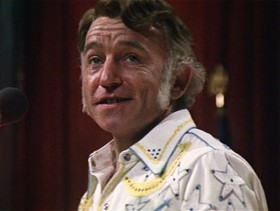 Watching Nashville, bursting with irony and exuberance, in its 35mm glory was a great experience as much as doing the same with Hitchcock’s Rear Window (1954) and Kubrick’s 2001: A Space Odyssey (1968). I got chills again watching the main title sequence that features a panoramic J. William Myers Jr. painting of all the characters (featured above). Even while listening to the slow, shivery rendition of the schmaltzy folk song “We Must Be Doing Something Right To Last 200 Years” sung by a leery Henry Gibson (Magnolia, 1999). I’ve been punch-drunk in love with the film having seen it a half-dozen times. If I had attempted to single out every performer and storyline here, I’d be at the IMDB all night.
Watching Nashville, bursting with irony and exuberance, in its 35mm glory was a great experience as much as doing the same with Hitchcock’s Rear Window (1954) and Kubrick’s 2001: A Space Odyssey (1968). I got chills again watching the main title sequence that features a panoramic J. William Myers Jr. painting of all the characters (featured above). Even while listening to the slow, shivery rendition of the schmaltzy folk song “We Must Be Doing Something Right To Last 200 Years” sung by a leery Henry Gibson (Magnolia, 1999). I’ve been punch-drunk in love with the film having seen it a half-dozen times. If I had attempted to single out every performer and storyline here, I’d be at the IMDB all night.
The director of Scarface (1932) and His Girl Friday (1940), Howard Hawks, once answered the question “what makes a good movie?”: “Three great scenes. No bad scenes.” It’s true of Nashville, which has much more than three. Had I to choose three, I would single out a moment very late in the film where three great scenes came together in a row.
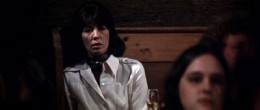 The scene is set in a tavern one night where Tom Frank, a handsome and monstrously hedonistic country singer, played by Keith Carradine (HBO’s Dexter, 2007), very gently sings, “I’m Easy” (the only won Academy Award out of five including Best Picture). Lily Tomblin (Flirting with Disaster, 1996) plays Linnea, a dissatisfied housewife and loving mother who sits in the shadows way back looking transfixed as though Tom were a siren. She thinks he’s singing to her (he is!). So does every woman in the audience who has already slept with him including Shelley Duvall, Cristina Raines, and the beautiful Geraldine Chaplin (“I’m Opal! I’m from the BBC!”). It’s such a bewitchingly vulnerable moment coated in hot tar.
The scene is set in a tavern one night where Tom Frank, a handsome and monstrously hedonistic country singer, played by Keith Carradine (HBO’s Dexter, 2007), very gently sings, “I’m Easy” (the only won Academy Award out of five including Best Picture). Lily Tomblin (Flirting with Disaster, 1996) plays Linnea, a dissatisfied housewife and loving mother who sits in the shadows way back looking transfixed as though Tom were a siren. She thinks he’s singing to her (he is!). So does every woman in the audience who has already slept with him including Shelley Duvall, Cristina Raines, and the beautiful Geraldine Chaplin (“I’m Opal! I’m from the BBC!”). It’s such a bewitchingly vulnerable moment coated in hot tar.
“I’m Easy”
Cut to the second scene in another tavern populated by men who’ve turned up for a political fund raiser — Vote for Hal Philip Walker. Gwen Welles plays Sueleen Gay (“Let me be the… ONE!”), a waitress who dreams of becoming a major singer whose hired as the night’s entertainment. A pity she’s tone-deaf. Sueleen naively uses her sex appeal on stage, oblivious to her lack of talent, and the boorish crowd boos her performance and demands nudity. The political backhanders (Ned Beatty, Deliverance, 1972 and Michael Murphy, Tanner 88′, 1988) bribe Sueleen who is on the verge of tears that she’ll perform with superstar Barbara Jean (Ronee Blakley, A Nightmare On Elm Street, 1984) if she shows skin. What follows is one of the most searingly sad stripteases right down to the taking the socks out of her bra.
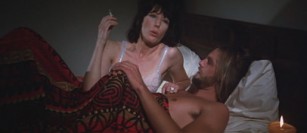 The third scene takes place in Tom’s motel room where he’s in bed with Linnea. Having had sex, she teaches him some sign language (her adorable children are deaf) and he is so engaged with her, surprising considering how he callously treats other women who fawn over him. Linnea figures its time to go (unheard by Linnea, another song “For the Sake of the Children, We Must Say Goodbye” from before could have played over it — thankfully it didn’t). Heartbroken by her leaving, Tom cruelly calls up another girlfriend by phone while Linnea gets dressed. Linnea is not affected and she kisses Tom goodbye. Having failed to hurt her, Tom hangs up the phone. Pauline Kael noted in her review that “he’ll remember her forever.”
The third scene takes place in Tom’s motel room where he’s in bed with Linnea. Having had sex, she teaches him some sign language (her adorable children are deaf) and he is so engaged with her, surprising considering how he callously treats other women who fawn over him. Linnea figures its time to go (unheard by Linnea, another song “For the Sake of the Children, We Must Say Goodbye” from before could have played over it — thankfully it didn’t). Heartbroken by her leaving, Tom cruelly calls up another girlfriend by phone while Linnea gets dressed. Linnea is not affected and she kisses Tom goodbye. Having failed to hurt her, Tom hangs up the phone. Pauline Kael noted in her review that “he’ll remember her forever.”
Nashville is a masterpiece, a staple to 1970s cinema and one of the quintessential films about America. Technically, it’s also a musical. The Nashville Music Industry were appalled that the movie didn’t use any existing music of their sour grapes. The actors wrote and sung their own songs. Even those who might have gone on to become country singers were denied by the heads of Nashville because their resentment was so great.
Before the showing of the feature I attended, the audience was posed this question: Which one out of the twenty-four characters does not show up at the concert near the end of the film. The answer to who it is: kcalb nerak. Listen much earlier in the film for why this is case by Haven Hamilton to Barnett (Allen Garfield, The Majestic, 2001).
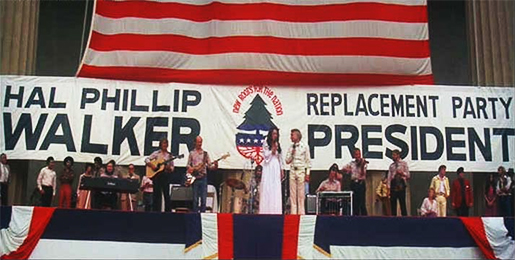
© 2008 – 2024, CINELATION | Movie Reviews by Chris Beaubien. All rights reserved.














